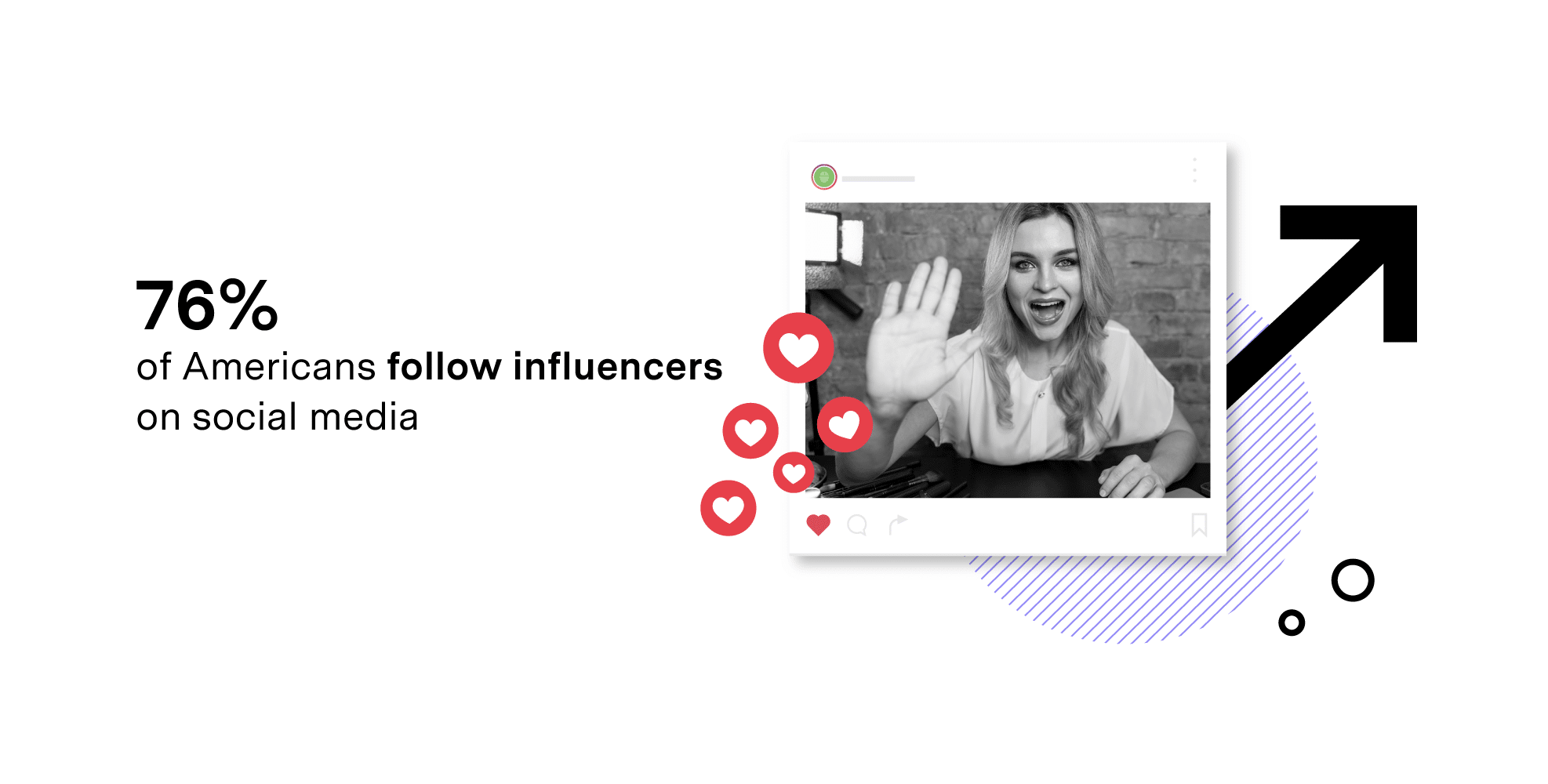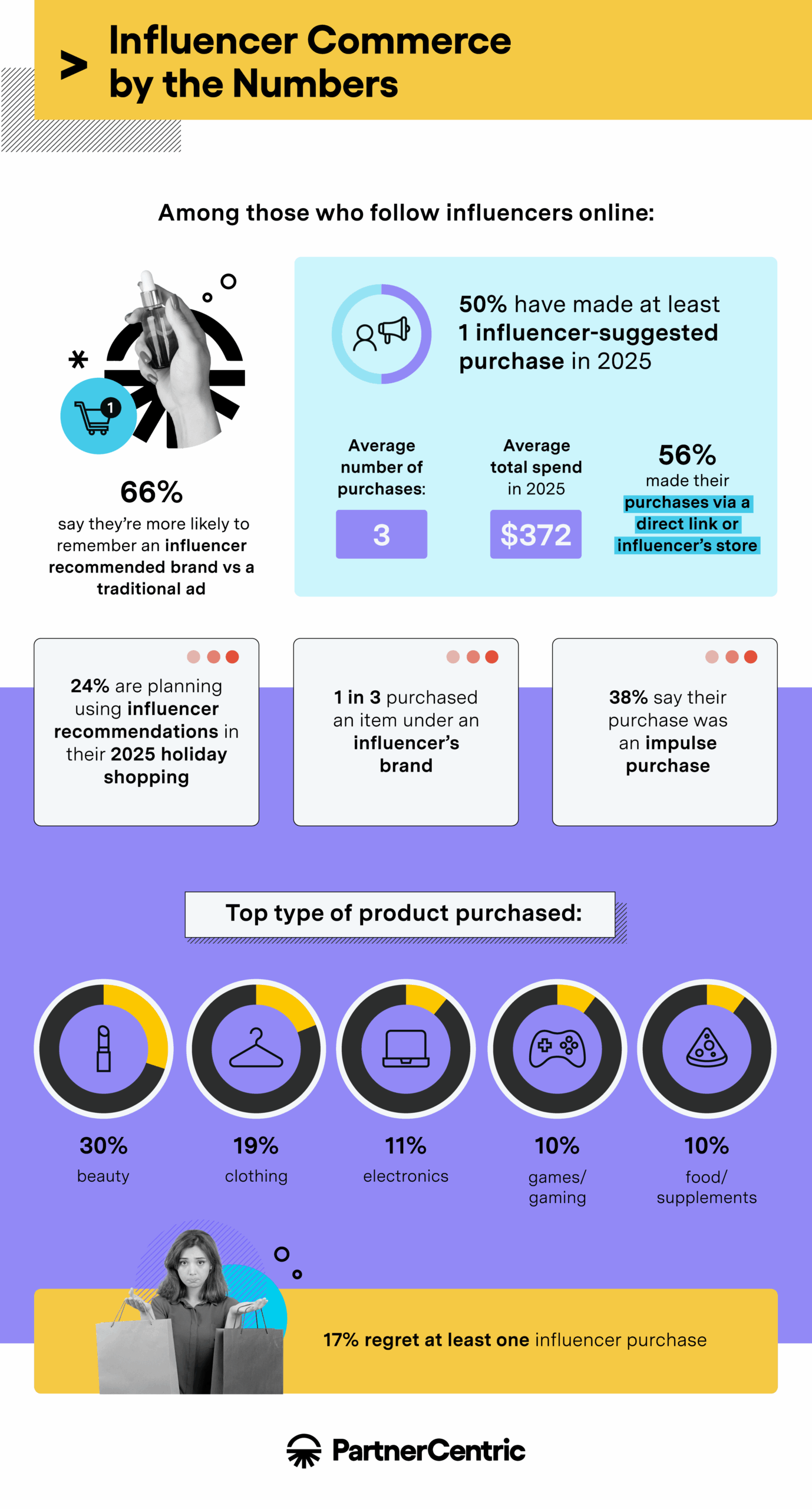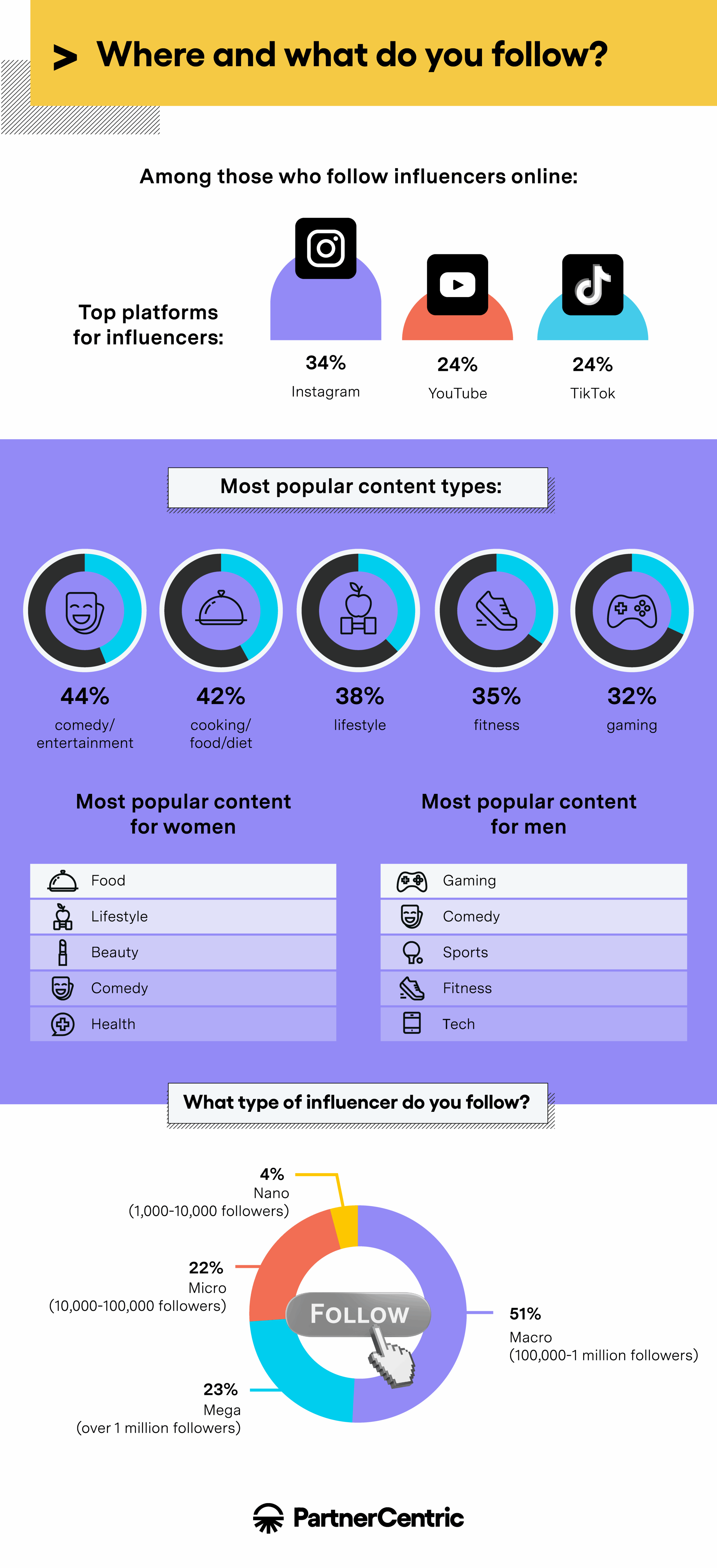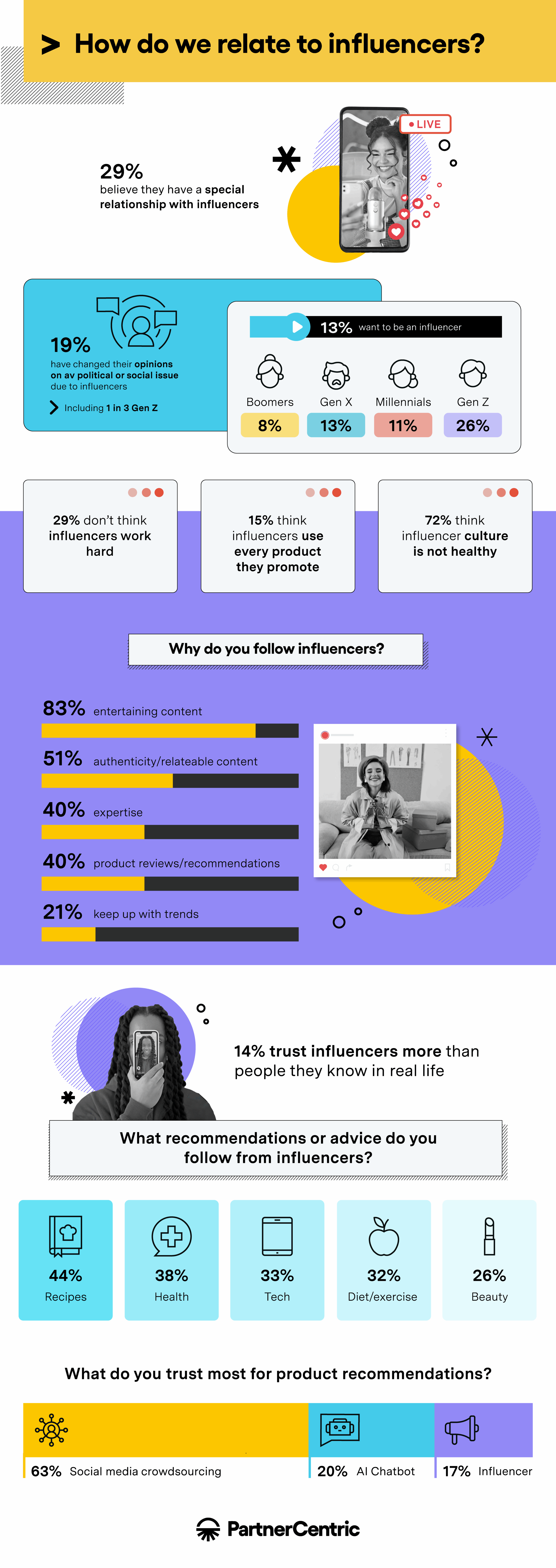September 23, 2025
The Anxiety of Influencers: Top Trends in Influencer Marketing 2025

Influencer Marketing Trends Shaping Culture and Commerce in 2025
Influencers aren’t just recommending products anymore — they’re shaping culture, driving commerce, shifting opinions, and competing with AI for consumer trust. As audiences change how they follow, shop, and listen, brands must rethink how influence really works in 2025.
Key Takeaways in this Blog
- 76% of Americans follow influencers, and half have already made a purchase based on an influencer recommendation in 2025.
- The average spend from influencer-driven purchases this year? $372 per person.
- 60% of followers remember influencer brand mentions more than traditional ads, proving recall > reach.
- Crowdsourcing and AI now outrank influencers when it comes to trusted product recommendations.
- 29% of followers report a parasocial connection with influencers — yet 72% say influencer culture isn’t healthy.
Influencer-Driven Commerce by the Numbers
Influencer culture is no longer niche. Seventy-six percent of Americans now follow influencers on social media, reflecting the changing face of internet advertising as creator-driven content grows in popularity. That influence runs deep: among those who follow online personalities, 60% say they’re more likely to remember a brand recommendation from an influencer than from a traditional ad.
- 76% of Americans follow influencers
- 66% of those who follow influencers are online are more likely to remember a brand an influencer recommends than a traditional ad
- 1 in 5 have changed their opinions on a social issue due to influencers
- 50% of those who follow influencers have made at least 1 influencer-suggested purchase so far in 2025, with an average total spend of $372
- Top platforms to follow influencers: Instagram (34%), YouTube (24%), TikTok (24%)
- 29% report a parasocial relationship with influencers
- Consumers prefer social media crowdsourcing and AI recommendations over influencers when it comes to product recommendations

38% of Americans have made a purchase based on influencer suggestion, with an average spend of $372 so far in 2025
Given how much literal influence that statistic reflects, it follows that influencers drive quite a lot of commerce. Half of influencer-following Americans (and therefore 38% of all Americans) have made at least one influencer-driven purchase in 2025, with an average of three purchases totaling $372 so far this year.
More than half of those purchases happened through direct links or influencer storefronts, which means these transactions happened very soon after engaging with creator content. In fact, 38% confess that their purchases were impulsive– and just over 1 in 6 regret making at least one of them. Platforms like TikTok make it especially easy to purchase fast with features like TikTok Shop to keep users within the app while still shopping.
Top types of products bought from influencers
- Beauty products 30%
- Clothing/accessories 19%
- Electronics 12%
- Games/gaming gear 10%
- Food products 10%
As for influencer-branded items, 1 in 3 have purchased something either created by or branded under an influencer.
Influencers are also shaping the upcoming holiday season. Nearly 1 in 4 (24%) followers plan to rely on influencer recommendations for their holiday shopping.
Where Do Americans Find influencers?
Instagram remains the dominant platform for influencer engagement, with 34% of followers turning there for content. YouTube and TikTok are tied in second place, each drawing 24% of influencer followers.

Most Popular Influencer Content
The type of content followers prefer ranges from purely entertaining influencers (44% prefer comedy and/or entertainment content) to cooking, lifestyle, and fitness. These latter categories especially lend themselves to easy brand deals and compelling content.
Analyzed by gender, top categories of content women enjoy are food, beauty, lifestyle, and health/healthcare. Men prefer gaming, comedy, and sports content from influencers. In general, women had more varied interests than men, who largely consumed comedy and sports.
Influencers are categorized by the size of their following. Our survey found the majority (51%) of Americans follow macro-influencers(those with 100,000 to 1 million followers).. After that, mega influencers (1 million+ followers) have 23% of the share, while micro- and nano-influencers shore up the rest. It seems the U.S. likes their influencers to be famous, but not too famous.
How Persuasive Are Influencers, Actually?

Influencers hold a certain sway over many Americans because their relationship with their followers is unique, and this can result in occasional projection from followers of a closer relationship than there actually is. More than 1 in 4 (29%) of those we surveyed feel they have a special or parasocial relationship with influencers they follow. This might be part of the reason why 72% don’t believe influencer culture is healthy.
The power of influencers doesn’t stop at commerce: 19% say that influencers have changed their opinion on a political or social issue. For Gen Zers, that number increases to a third. Furthermore, 13% of Americans want to become influencers, increasing to 26% for Gen Z. Unfortunately, this might be due to some myths: 29% of Americans don’t believe influencers work hard, and 15% think that influencers actually use every product they promote or endorse.
Why Follow Influencers?
For 83%, following these online personalities is all about entertainment. Over half (51%) appreciate the authenticity or relatability of influencer content, while 40% value expertise and or product reviews. Finally, just over 1 in 5 follow influencers to keep up with trends.
What Advice and Recommendations Do Americans Follow from Influencers?
Americans follow influencer advice across many subjects, including recommended recipes (44%), health advice (38%), tech recommendations (33%), diet and/or exercise regimens (32%), and beauty tips and recommendations (26%).
This comes with a caveat, however: when compared to crowdsourcing on social media and chatting with an AI chatbot, influencers came in third in terms of trust. Most prefer crowdsourcing (63%), followed by AI (20%), and only then influencers (17%). Perhaps the double-consciousness of enjoying influencer content while knowing they are making money from their recommendations is preventing Americans from wholly buying into what influencers are telling them to do.
The internet is changing; AI influencers are a new trend but gaining popularity: 6% of followers knowingly follow an AI-generated influencer, but 9% are unsure if they do. Not only that, but 1 in 10 report positive sentiment towards the fictional influencers, and 13% of those who made an influencer purchase report at least one of them being from an AI influencer recommendation.
As the ecosystem of social media shifts with usage trends, influencers will adapt with it.
FAQ: 2025 Influencer Trends
Q: Are influencers still driving purchases in 2025?
A: Yes, and more than ever. Half of all influencer followers have made a purchase this year, averaging $372 spent so far.
Q: Do people still trust influencers?
A: They trust the entertainment and expertise — but not always the recommendation. Crowdsourcing and AI now outrank influencers for product guidance.
Q: What platforms perform best for influencer marketing?
A: Instagram leads overall, but TikTok drives the most fast-conversion purchases thanks to in-app checkout tools like TikTok Shop.
Q: Are AI influencers replacing human creators?
A: Not yet — but they’re gaining traction, especially in low-trust product categories where personality matters less than convenience.
Q: What makes an influencer actually persuasive?
A: Relatability + niche expertise + aligned values. Not just follower count.
Ready to Turn Influence Into Measurable Performance?
PartnerCentric helps brands move past “post and pray” influencer marketing and into verified incrementality. Whether you’re scaling creator partnerships or trying to separate influence from hype, our tech and team can help.
Book a strategy call to see how performance-grade influencer programs really work.
Methodology & Fair Use
In September 2025, we surveyed 1,003 Americans from across the U.S. on their opinions and habits around influencers and social media. 49% were women, 50% men, and 1% were either nonbinary or did not disclose. Ages ranged from 19 to 75 with an average age of 42.
For media inquiries, please contact media@digitalthirdcoast.net
Fair use: When using this data and research, please attribute by linking to this study and citing PartnerCentric.com.
Ready for better
This form is protected by reCAPTCHA and the Google Privacy Policy and Terms of Service apply.